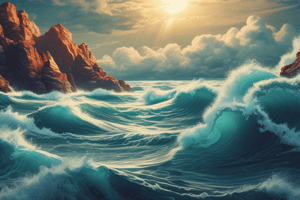Podcast
Questions and Answers
What primarily causes tides in the oceans?
What primarily causes tides in the oceans?
- The temperature differences in the water
- The rotation of Earth about its axis
- The gravitational forces between the Earth, Moon, and Sun (correct)
- The wind currents and weather patterns
Why does the Moon have a greater impact on ocean tides compared to the Sun?
Why does the Moon have a greater impact on ocean tides compared to the Sun?
- The Moon has a larger mass than the Sun
- The Moon revolves faster around Earth than the Sun
- The Moon is located much closer to the Earth (correct)
- The Sun eclipses the Moon during high tides
How often does Earth make one complete rotation on its axis?
How often does Earth make one complete rotation on its axis?
- Every 24 hours (correct)
- Every 12 hours
- Every 365 days
- Every 28 days
What force will move the ocean water level back down after it has flooded the beach?
What force will move the ocean water level back down after it has flooded the beach?
What is the period of one revolution of the Moon around Earth?
What is the period of one revolution of the Moon around Earth?
What primarily causes high tides on Earth?
What primarily causes high tides on Earth?
What role does inertia play in the formation of tides?
What role does inertia play in the formation of tides?
How do high tides occur simultaneously on two sides of Earth?
How do high tides occur simultaneously on two sides of Earth?
What happens to the water on the side of Earth facing the Moon?
What happens to the water on the side of Earth facing the Moon?
What is a low tide?
What is a low tide?
Flashcards
Gravity
Gravity
The force that attracts objects with mass towards each other.
Inertia
Inertia
The tendency of an object to resist changes in its motion.
High tide
High tide
The highest point on a shore that water reaches due to the Moon's gravitational pull.
Low tide
Low tide
Signup and view all the flashcards
Tidal bulges
Tidal bulges
Signup and view all the flashcards
Tides
Tides
Signup and view all the flashcards
Earth's Axis
Earth's Axis
Signup and view all the flashcards
Moon's Gravity vs. Sun's Gravity
Moon's Gravity vs. Sun's Gravity
Signup and view all the flashcards
High and Low Tides
High and Low Tides
Signup and view all the flashcards
Study Notes
Ocean Tides
- Tides are the regular rise and fall of ocean and lake water levels
- Tides are caused by the gravitational forces of the Sun, Earth, and Moon
- The Moon's gravity affects Earth's water more than the Sun's, despite the Sun's greater mass, because the Moon is closer to Earth
Gravity in the Sun-Earth-Moon System
- Earth rotates on its axis once a day
- The Moon revolves around Earth in about 28 days
- Earth revolves around the Sun in about 365 days
- Gravitational forces between the objects affect each other
- Gravitational force depends on the mass of the objects and the distance between them
- The Moon's gravity is stronger on Earth than the Sun's, even though the Sun is much larger, due to the Moon's proximity to Earth.
- Ocean water is affected more by the Moon's gravity than the Sun's
High and Low Tides
- High tides occur on the side of Earth facing the Moon and on the opposite side
- Low tides occur at right angles to the high tides
- These are caused by the Moon's gravity pulling water toward it and by inertia (the tendency of objects to resist changes in motion)
- Tides move around the Earth as it rotates, resulting in a cycle of high and low tides
Spring Tides
- Spring tides occur when the Sun, Earth, and Moon are aligned
- This alignment amplifies the gravitational forces, leading to higher high tides and lower low tides
Neap Tides
- Neap tides occur when the Sun, Earth, and Moon form a right angle
- This reduces the gravitational forces, leading to less difference between high and low tides
Tidal Variations
- The range between high and low tides varies throughout the year
- The greatest difference in high and low tides occurs around January 2, when Earth is closest to the Sun in its elliptical orbit
- The smallest difference in high and low tides occurs around July 2, when Earth is farthest from the Sun in its elliptical orbit
Tidal Power Plants
- Tidal power plants use the kinetic energy of rising and falling tides to generate electricity
- Turbines convert the energy of the moving water into electricity
Studying That Suits You
Use AI to generate personalized quizzes and flashcards to suit your learning preferences.


